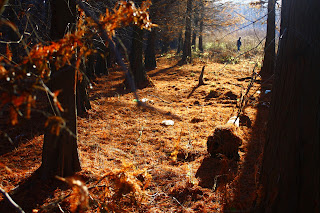First, I should unravel something about the way I watch movies – I basically enjoy every movie I watch, trying not to be too harsh, judgmental or cynical, considering the fact that I’m still somehow in the learning process of making movies. This is why my friends would often hear me say this exact sentence, over and over: ‘I’ve recently watched this … (fill in the blanks with movie title) and it was really good. Well, actually…’ and then I develop the idea.
But seriously, ‘Aurora’ has been the first movie I watched this year, a story set in gloomy, contemporary Bucharest – a slice of life, if you may call it that way – where a divorced man follows his ex-wife through town with the not-so-obvious intention of killing her. The movie is long – three hours – and as some interesting critics who haven’t even had the decency to watch an entire movie before reviewing it say – pretty boring. But instead of boring I would like to call it slow paced, aerated, leaving just enough room for the characters to develop and for the viewer to get accustomed to their lifestyle. I think it was actually polite – yes, I’ll use this word – that the director took the time he thought he needed in describing the characters (mostly the main character, played by the director himself) and the situations created by the relationships the characters are in. And even though the movie opens with a post-sex scene between Viorel (main character) and his new mistress (Gina – played by Clara Voda), I really think this way of opening a movie was necessary in order to establish the ‘slice of life’ perspective – it doesn’t really matter where you start the story, it’s their everyday life anyway, but where the story takes you. The story runs you through the relationship Viorel has with Gina, which is pretty simple and uninvolved from what concerns Viorel – she keeps telling him about her daughter learning about Little Red Riding Hood but he starts replying after she has already changed the subject. You can almost feel her care for him, when she hands him a wrapped sandwich for work. Instead of going to work, a really wide shot discovers him stop the car in front of some railways, getting out, crossing it at night just to spy on his wife going to work and taking his daughters to school at the break of dawn.
He then goes to work, where it is implied (this is what I understood, at least) that he’s clearing out his desk and office because he had been fired. I’ve always loved Cristi Puiu’s subtlety, but this time I only got this from a singular line of an employee of the plant. This employee then slips him a few self made bullets.
I know I’ve said this before, but it feels like religion, sympathy, decency and relationships are all dying and the scene is the Romanian New Wave Cinema. They’re not dead yet – the way they are presented in Sergei Loznitsa’s ‘My Joy’ (2010 – ‘Schastye moe’), but they are really dying in front of the viewer and the only breaths of fresh air are, in this case, the innocent kid we see in the movie (Viorel’s daughter, not Gina’s spoiled brat) or the collateral victim (Viorel’s ex-wife’s layer’s date). It just feels like the situations in the movie, as well as the characters’ behavior are decaying in front of us.
Almost the entire movie is shot with wide or normal lenses, the camera doesn’t really get involved, keeping a distance between the viewer and the character. The viewer is a simple observer and he can make his own opinions about the situations depicted in the movie. I personally enjoy watching a movie that puts this sort of distance between me and the characters, I believe there’s no better way of shooting a story like this one. There’s a specific connection the actor/director sets at some point in the movie with the spectator and this consists of a medium shot taken from the backseat of the car Viorel is driving, when he stares through the rear view mirror straight at the camera, piercing through the barrier or the lens. It is right there when we discover the eyes considering killing a person. The movie is almost a study, a documented murder.
An hour into the movie, I can finally say I figured out the complete set of relationships and main behavior features of the characters. Viorel is distant, intellectual, listens to good music in the apartment that once belonged to him and his wife – apartment that is now being renewed (a vision?) – is highly specific about his stuff (he tells his wife’s father to only take certain things back to her) and wear his hood inside out for the entire three hours which makes an OCD viewer want to reach for the screen and put it back in (this is where I had my issues and felt mind raped).
I like the way Puiu chose the show the murder of his mother – in – law, through a handheld long shot that follows the woman going up the stairs in her home, and then following Viorel and letting the viewer literally staring at the ceiling and just letting the sound give us the idea of what’s going on upstairs – talk about Puiu’s subtlety again! And even though he only manages to shoot his wife’s lawyer (which launches the question: ‘did this guy fuck his wife too while dealing with their divorce papers?’) and his in – laws, he goes to the police station to confess in the coldest way. The director chooses to depict the Romanian authorities the same way a lot of other Romanian movies do – these policemen are talking about the murders when he walks in, and even though he sais he’s the one responsible for them they don’t even mind his existence in the room, they just make him write his statement. This would seem absurd for a non-Romanian citizen, but if you’ve lived here all your life, you’ll know this is just the way they handle ‘cases’ (see also ‘Police, Adjective’ – Corneliu Porumboiu, 2009).
Just one more thing: Puiu migrates at least a character from an older movie ‘The Death of Mr. Lazarescu’ (2005 – Un Certain Regard Award at the Cannes Film Festival), Mrs. Mioara Avram (interpreted by Luminita Gheorghiu) to underline the humanity of these characters and the idea that they could exist in every other movie or in everyday life.
In other words, I liked not everything being explained because it involves the viewer more, I liked the slow paced sequences and the fact that it launches questions not everyone of us would answer the same way.













